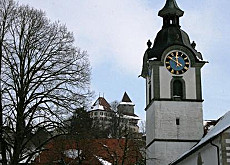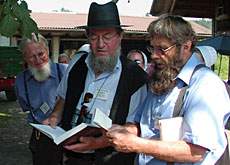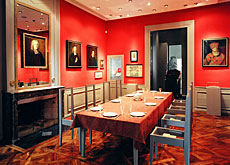Swiss reach out to Anabaptist communities

State and church authorities have launched a series of commemorative events to reconcile the Swiss with a dark chapter from their past.
More than 200 events will recall the persecution of Anabaptists – divided mainly into Mennonites and Amish today – which began during the Reformation and did not end until the early 19th century.
“We, as the indirect successor to the political authorities of that time, regret the injustices done to so many and the suffering caused,” said Werner Luginbühl, president of canton Bern’s government, during the opening ceremony on Saturday.
The well-attended service at the Protestant church in the town of Langnau marked the start of the Anabaptist commemorative year in the canton’s rural Emmental region.
It was in this part of Switzerland that the authorities brutally repressed the Anabaptists, who challenged the 16th century reforms of Martin Luther and one of the Swiss leaders of the Reformation, Ulrich Zwingli, saying they were not radical enough.
For their refusal to accept the new state-run church, and insistence on adult instead of infant baptism, they were subject to imprisonment, torture, expulsion and even execution.
Persecution continued at least until 1810 in Switzerland whereas it lasted only a few decades in the Netherlands, which also had a sizeable, influential Anabaptist community.
“It’s incomprehensible today how hard the state came down on these people,” Luginbühl told swissinfo. “The focus of this event should be on building bridges.”
Taboo
There was official reconciliation between Switzerland’s Protestant and Mennonite churches in the 1970s, but Anabaptist history has remained a “taboo subject”, according to the main coordinator of the event, Fritz von Gunten.
“We’d prefer to talk about success and positive aspects of the past rather than dark chapters,” von Gunten told swissinfo. “We realised that even though there are Anabaptists living in the Emmental today who are well integrated into their communities, the population knows very little about their history.”
Von Gunten said he has been overwhelmed by the number of projects submitted for inclusion in the official programme, designed to raise awareness of the past. They include plays, exhibitions and excursions throughout Bern and neighbouring cantons in northwestern Switzerland.
Yet in the words of Paul Gerber, president of the Swiss Mennonite Conference, the country’s existing Anabaptist community is uneasy about suddenly finding itself in the spotlight.
True to faith
In his address, Gerber said the challenge for Mennonites today was to remain true to their faith despite the newfound attention.
He also reminded the audience that while Anabaptists no longer suffer because of their beliefs, people are still being persecuted in Switzerland today, making a veiled reference to the fate of asylum seekers.
“They are neither burned nor drowned; but the response [by the authorities] is often to ‘reject’ them.”
Switzerland has tightened its asylum laws in recent years, making them among the most restrictive in Europe, and right-wing parties continue to run anti-foreigner campaigns, often depicting Muslims in a bad light.
Participation in the commemorative year, according to Samuel Lutz, a leading Protestant church official, underscores his church’s aim of promoting peace, understanding and inter-religious dialogue.
“Our strong conviction for what we believe to be the truth – our exclusiveness – shouldn’t lead to the persecution of others,” he said.
swissinfo, Dale Bechtel in Langnau
Events are being held throughout canton Bern and northwestern Switzerland to remember the persecution of Switzerland’s Anabaptists.
Visitors from abroad are being encouraged to attend an international gathering in the Emmental from July 26-29.
There are believed to be around 600,000 descendants of Swiss Anabaptists living in North America.
In 1525, former associates of Ulrich Zwingli began to baptise adults, and these “Swiss brethren” as they became known rejected the new reformed church and founded congregations independent of the state.
Similar movements soon developed across western Europe. Followers, who would be called Mennonites after Menno Simmons, an Anabaptist leader from the Netherlands, were persecuted for refusing to participate in the state-run church.
Internal divisions led a radical faction, the Amish, to split in 1693. Members took their name from Anabaptist leader Jakob Ammann, who came from canton Bern’s Simmental valley.
There are 14 Mennonite congregations in Switzerland today, with around 2,500 members.

In compliance with the JTI standards
More: SWI swissinfo.ch certified by the Journalism Trust Initiative




You can find an overview of ongoing debates with our journalists here. Please join us!
If you want to start a conversation about a topic raised in this article or want to report factual errors, email us at english@swissinfo.ch.